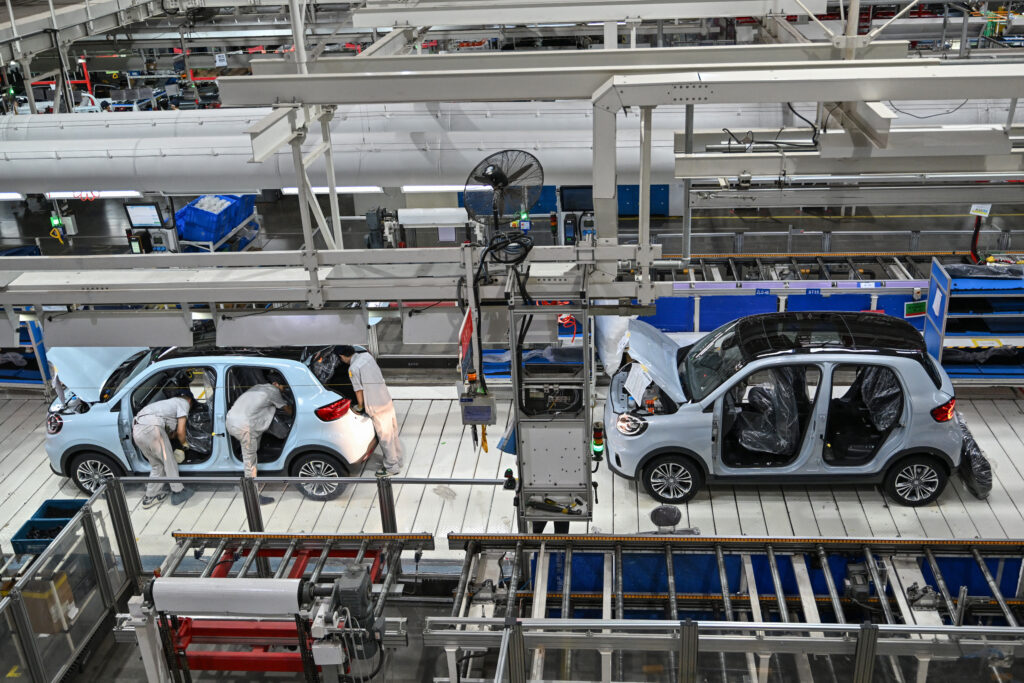
The European Union has initiated a significant economic measure against China by imposing tariffs on electric vehicles (EVs), escalating the risk of retaliatory actions and potential repercussions for domestic businesses and consumers. The EU voted to raise tariffs as high as 45%, arguing that China’s subsidies for its car manufacturers unfairly distort the market. China, however, has denied these claims and threatened reciprocal tariffs targeting European sectors like dairy, pork, and automobiles. This move by the EU aligns with the United States’ tougher stance on Chinese trade practices but is designed to remain within the boundaries of World Trade Organization (WTO) rules.
French President Emmanuel Macron has expressed concern that Europe’s economic structure requires fundamental changes, warning that failure to match the domestic investments and protections of both the US and China could jeopardize the EU’s economic future. The EU leadership is expected to unveil a new competitiveness roadmap next month to address these challenges. Janka Oertel, a director at the European Council on Foreign Relations, described the tariff vote as a critical moment for EU-China relations, suggesting that successful implementation could bolster the EU’s position in addressing broader market distortions and strategic dependencies.
Former European Central Bank President Mario Draghi echoed Macron’s concerns in a report on Europe’s competitiveness, stating that without significant investment in economic transformation, the EU risks falling behind the competition posed by Beijing and Washington. He emphasized that the EU’s slower economic growth compared to the US, partly due to lower productivity gains, has already been felt in key industries. The consequences of China’s aggressive industrial policies, supported by substantial subsidies, are becoming increasingly evident in sectors critical to Europe’s future, such as digital and clean technologies.
China’s response to the EU’s decision has been swift. The country’s commerce ministry warned that the tariffs would undermine Chinese companies’ confidence in investing in Europe. Chinese state media further cautioned that the EU risks losing investment from China’s EV sector, which could hinder Europe’s efforts to modernize its own automotive industry.
Several European automakers have been facing challenges in recent months. Volkswagen AG and Mercedes-Benz Group AG have struggled to maintain market relevance in China, while BMW AG has dealt with costly recalls, and Stellantis NV is grappling with poor sales in the US. These difficulties have led to profit warnings from several companies, with VW even considering shutting down some of its German plants. Despite these setbacks, the European auto sector saw a slight recovery in share prices following the tariff vote, as analysts suggested the decision had already been factored into market expectations.
The broader context of this tariff dispute reflects a shift in the EU’s approach to China. After years of limited progress in addressing issues like industrial subsidies and restricted market access, the EU has grown more assertive, spurred by China’s advancements in critical sectors. As the world’s largest trading bloc, the EU has traditionally benefited from multilateral trade, but the increasingly hostile global environment, driven by competition for raw materials and economic rivalry between the US and China, is prompting Europe to reconsider its strategies.
While the EV tariffs align with the EU’s current political priorities, they carry significant economic risks. With the EU still grappling with inflation, a global trade war could lead to renewed consumer-price pressures. The European Central Bank is expected to cut interest rates again later this month, but the uncertainty surrounding trade tensions, rising oil prices, and the resilience of the US economy may complicate the bank’s decision-making process. Additionally, the World Bank has warned that tariffs could increase production and shipping costs, potentially leading producers to pass those costs onto consumers.
German Economic Minister Robert Habeck underscored the importance of avoiding a trade war, stating that Europe must find a negotiated solution to countervailing duties. He emphasized that Europe’s strength lies in its unity, and warned that without a unified response, China’s industrial strategies could target other sectors in the future.
Featured Image courtesy of POLITICO.eu
Follow us for more updates on the tariff.
